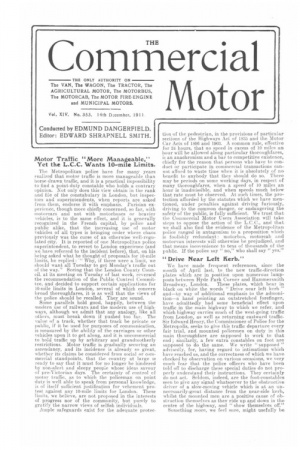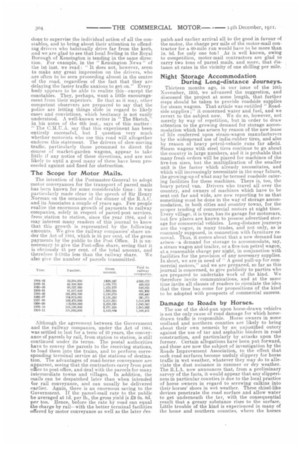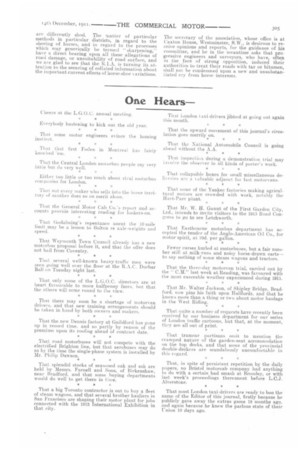Motor Traffic "More Manageable," Yet the L.C.C. Wants 10-mile Limits.
Page 1

Page 2

Page 3

If you've noticed an error in this article please click here to report it so we can fix it.
The Metropolitan police have for many years realized that motor traffic is more manageable than liorse-drawn traffic, and it is a practical impossibility to find a point-duty constable who holds a contrary opinion. Not. only does this view obtain in the rank and file of the constabulary in London, but. inspectors and superintendents, when reports are asked from them, endorse it with emphasis. Parisian experience, though more chiefly concerned, so far, with motorcars and not with motorbuses or heavier vehicles, is to the same effect, and it is generally re-cognized in the French capital, by police and public alike, that the increasing use of motor vehicles of all types is bringing order where chaos previously was the curse of an otherwise well-regulated city. It is reported of one Metropolitan police superintendent, to revert to London experience (and we have referred to the incident before), that, on his being asked what he thought of proposals for 10-mile limits, he replied: " Why, if there were a limit, we should want all Tuesday to get Monday's traffic out of the way." Seeing that the London County Council, at its meeting on Tuesday of last week, reversed the recommendation of the Public Control Committee, and decided to support certain applications for 10-mile limits in London, several of which concern broad thoroughfares, it is as well that the views of the police should be recalled. They are sound.
Some parallels hold good, happily, between the modern use of railways and the modern use of highways, although we admit that any analogy, like all others, must break down if pushed too far. The value of a track, whether that track be private or public, if it be used for purposes of communication, is measured by the ability of the carriages or other vehicles upon it to get along, and it is uncommercial to hold traffic up by arbitrary and grandmotherly restrictions. Motor traffic is gradually securing an ascendancy, and its incidence is already so great, whether its claims be considered from social or commercial standpoints, that the country at large is ready to say that it must for no longer be hindered by non-alert and sleepy people whose ideas savour of pre-Vieterian days. The certainty of control of motor traffic, as to which the policeman on point duty is well able to speak from personal knowledge, is of itself sufficient justification for vehement protest against any 10-mile limits for London. These limits, we believe, are not proposed in the interests of progress nor of the community, but purely to gnarly the narrow views of selfish individuals.
Ample safeguards exist for the adequate protec
tion of the pedestrian, in the provisions of particular sections of the Highways Act of 1835 and the Motor Car Acts of 1896 and 1903. A common rule, effective for 24 hours, that no speed in excess of 10 miles an hour will be allowed along particular thoroughfares, is an anachronism and a bar to competitive existence, chiefly for the reason that persons who have to conduct or participate in commercial transactions cannot afford to waste time when it is absolutely of no benefit to anybody that they should do so. There may be periods on some working days, in respect of many thoroughfares, when a speed of 10 miles an hour is inadmissible, and when speeds much below that rate must be observed. At such times, the protection afforded by the statutes which we have mentioned, under penalties against driving furiously, driving to the common danger, or endangering the safety of the public, is fully sufficient. We trust that the Commercial Motor Users Association will take steps to oppose the action of the L.C.C., and that we shall also find the evidence of the Metropolitan police ranged in antagonism to a proposition which is foolishly redundant : motorbos, motorcab and motorvan interests will otherwise be prejudiced, and that means incovenience to tens of thousands of the public, if the police say " no," who shall say " yes?'
"Drive Near Left Kerb."
We have made frequent references, since the month of April last, to the new traffic-direction plates which are in position upon numerous lampposts between Hyde Park Corner and Hammersmith
Broadway, London. These plates, which bear in black on white the words " Drive near left kerb " and—by way of additional emphasis to the admonition—a hand pointing an outstretched forefinger, have admittedly had some beneficial effect upon traffic in the main highway to which we refer, and which highway carries much of the west-going traffic from London, as well as returning eastward traffic. Sir Edward Henry, the Commissioner of Police for the Metropolis, seeks to give this traffic departure every fair trial, and mounted policemen on duty in this main thoroughfare are supposed to work to that end; similarly, a few extra constables on foot are supposed to do the same. We write "supposed " advisedly, for, having regard to intimations which have reached us, and the correctness of which we have checked by observation on various occasions, we very much fear that the police officers who have been told off to discharge these special duties do not properly understand their instructions. They certainly do not act. Seldom, indeed, are the foot-constables seen to give any signal whatsoever to the obstructive driver of a slow-moving vehicle which is at an unnecessarily-great distance from the near-side kerb, whilst, the mounted men are A positive cause of ASO' tictioti themselves as they ride up and down in the centre of the highway, and " show themselves off?'
Something more, we feel sure, might usefully be
done to supervise the individual action of all the constables, and to bring about their attention to offending drivers who habitually drive far from the kerb, and we are glad to see that local feeling in the Royal Borough of Kensington is tending in the same direction. For example, in the " Kensington News " of the 1st inst. we read : " It does not, however, seem to make any great impression on the drivers, who are often to be seen proceeding almost in the centre of the road, regardless of the fact that they are delaying the faster traffic anxious to get on." Everybody appears to be able to realize this—except the constables. They, perhaps, want a little encouragement from their superiors. Be that as it may, other competent observers are prepared to say that the police are letting things slide in regard to likely cases and convictions, which hesitancy is not easily understood. A well-known writer in "The Sketch," in his notes of the eth inst., says of this matter : " The C.M.U.A. say that this experiment has been entirely successful, but I question very much whether motorists who use this road will altogether endorse this statement. The drivers of slow-moving traffic, particularly those presumed to direct the course of market-garden wagons, appear to take little if any notice of these directions, and are not likely to until a good many of them have been proceeded against and fined for obstruction.
The Scope for Motor Mails.
The intention of the Postmaster-General to adopt motor conveyances for the transport of parcel mails has been known for some considerable time : it was particularly made clear in the speech of Sir Henry Norman on the occasion of the dinner of the R.A.C. and its Associates a couple of years ago. Few people realize the enormous growth of payments to railway companies, solely in respect of parcel-post services, from station to station, since the year 1884, and it may interest many readers of this journal to know that this growth is represented by the following amounts. We give the railway companies' share under the Act of 1884, which is 55 per cent, of the gross payments by the public to the Post Office. It is unnecessary to give the Post-office share, seeing that it is obviously 45 per cent. of the total amount, and therefore 2-11ths less than the railway share. We also give the number of parcels transmitted.
Although the agreement between the Government and the railway companies, under the Act of 1884, was settled to last for a term of .20 years, the conveyance of parcels by rail, from station to station, is still continued under its terms. The postal authorities have to convey the parcels to the receiving stations, to load them into the trains, and to perform corresponding terminal service at the stations of destination. The advantages of road-borne conveyance are apparent, seeing that the contractors carry from post office to post office, and deal with the parcels for many intermediate towns and villages. In addition, the mails can be despatched later than when intended (or rail conveyance, and can usually be delivered earlier. Again, there is an enormous saving to the Government. If the parcel-mail rate to the public be averaged at ld. per lb., the gross yield is 29 Os. 8d. per ton. Hence, before the rate by road can equal the charge by rail--with the better terminal facilities offered by motor conveyance as well as the later des
patch and earlier arrival all to the good in favour of the motor, the charge per mile of the motor-mail contractor for a 00-mile run would have to be more than Is. 8d. for only one ton 1 As is well known, owing to competition, motor-mail contractors are glad to carry two tons of parcel mails, and more, that distance at rates in the vicinity of one shilling per mile.
Night Storage Accommodation
During Long-distance Journeys.
Thirteen months ago, in our issue of the 10th November, 1910, we advanced the suggestion, and discussed the project at some length, that further steps should be taken to provide roadside supplies for steam wagons. That article was entitled " Roadside supplies ;" it concerned water and fuel, and we revert to the subject now. We do so, however, not merely by way of repetition, but in order to draw attention to the growing demand for storage accommodation which has arisen by reason of the new lease of life conferred upon steam-wagon manufacturers by the widespread use of india-rubber tires, and also by reason of heavy petrol-vehicle runs far afield. Steam wagons with steel tires continue to go about the country in large numbers, and it is probable that many fresh orders will be placed for machines of the five-ton sizes, but the multiplication of the smaller unit is the factor which already necessitates, and which will increasingly necessitate in the near future, the growing-up of what may be termed roadside catering facilities for these machines. There is, too, the heavy petrol van. Drivers who travel all over the country, and owners of machines which have to be sent out far and wide, are now reporting to us that something must be done in the way of storage accommodation, in both cities and country towns, for the proper tending of commercial motors at night time. Every village, it is true, has its garage for motorcars, but few places are known to possess advertised storage for commercial vehicles. Long-distance journeys are the vogue, in many trades, and not only, as is commonly supposed, in connection with furniture removal. Thus, it comes about that a new demand has arisen--a demand for storage to accommodate, say, a steam wagon and trailer, or a five-ton petrol wagon, at a reasonable charge per night, in conjunction with facilities for the provision of any necessary supplies. In short, we are in need of" A. good pull-up for commercial motors," and we are prepared, so far. as this journal is concerned, to give publicity to parties who are prepared to undertake work of the kind. We therefore invite communications, and at the same time invite all classes of readers to circulate the idea that the time has come for propositions of the kind to be adopted with prospects of commercial success.
Damage to Roads by Horses.
The use of the skid-pan upon horse-drawn vehicles is not the only cause of road damage for which horsedrawn traffic is responsible. Horse owners in some midland and northern counties are likely to bring about their own nemesis by an unjustified outcry against the use of tar and asphaltic binders in road construction, and particularly by attacks upon the former. Certain allegations have been put forward, and these are now the subject of investigation by the Roads Improvement Association, to the effect that such road surfaces become unduly slippery for horse traffic in wet weather, whatever they may do to alleviate the dust nuisance in summer or dry weather. The _ELLA. now announces that., from a preliminary survey of the facts, it would appear that any slipperiness in particular counties is due to the local practice of horse owners in regard to screwing calkins into their horses' shoes in wet weather. These chisel-like devices penetrate the road surface and allow water to get underneath the tar, with the consequential result that a greasy substance rises to the surface. Little trouble of the kind is experienced in many of the home and southern counties, where the horses
are differently shod. The matter of particular methods in particular districts, in regard to the shoeing of horses, and in regard to the processes which may generically be termed " sharpening," have a direct bearing upon all these allegations of road damage, or unsuitability of road surface, and we are glad to see that the R.1.A. is turning its attention to the securing of collated information about the important current effects of horse-shoe variations. The secretary of the association, whose office is at Caxton House, Westminster, S.W., is desirous to receive opinions and reports, for the guidance of his committee, and he in the meantime asks that progressive engineers and surveyors, who have, often in the face of strong opposition, induced their authorities to treat their roads with tar or bitumen, shall not be condemned upon a new and unsubstantiated cry from horse interests.




















